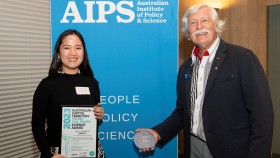Murray Badger
Lab research
My lab is focussed on understanding the ways different photosynthetic organisms have adapted their photosynthetic biochemistry and physiology to efficiently fix CO2 in environments where CO2 is a limiting substrate. This includes interests in the biochemical deficiencies of Rubisco (where I started in my PhD), how organisms have developed CO2 concentrating mechanisms (my first postdoc) to overcome these limitations, and how the biochemical pathway of photorespiration deals with the waste products of the Rubisco interaction with O2. We use organisms ranging from cyanobacteria and algae up the plant model systems such as Arabidopsis, spanning different evolutionary scales of photosynthetic development.
Greatest achievement
Perhaps my greatest achievement has been to clearly describe that the evolution of efficient photosynthetic CO2 fixation is driven by a co-evolution of both Rubisco and its kinetic properties and the development of different photosynthetic CO2 concentrating mechanisms in cyanobacteria, algae, and plants. This evolutionary process is dependent on the nature of the environment which the organism evolves in, including the CO2 supply, the O2 levels and the temperature.
Next big thing
This is hard to say. The challenge of using the ever expanding genomics revolution to understand more about the evolution of photosynthesis and its various components will be a focal point. However, the bridge between genomic evolution and how it has been used to specify functional variation will be a challenging hurdle that will be underpinned by detail and not just genomic correlation.
What do you see as future challenges for your field of research?
Photosynthesis is the basis of all food production and for me, the challenge facing many researchers in the various areas of photosynthesis is how what we have already discovered about aspects of photosynthesis can be used to improve crop yields and contribute to future world food security. The award of our new ARC CoE for Translational Photosynthesis directly addresses this challenge from an ANU and Australian perspective and reaching tangible improved photosynthesis outcomes over the next seven years will be the greatest challenge of my research career.
- This profile originally appeared in the RSB newsletter, issue 50, December 2013
- Badger Lab - Photosynthetic functional genomics
- ARC CoE for Translational Photosynthesis







